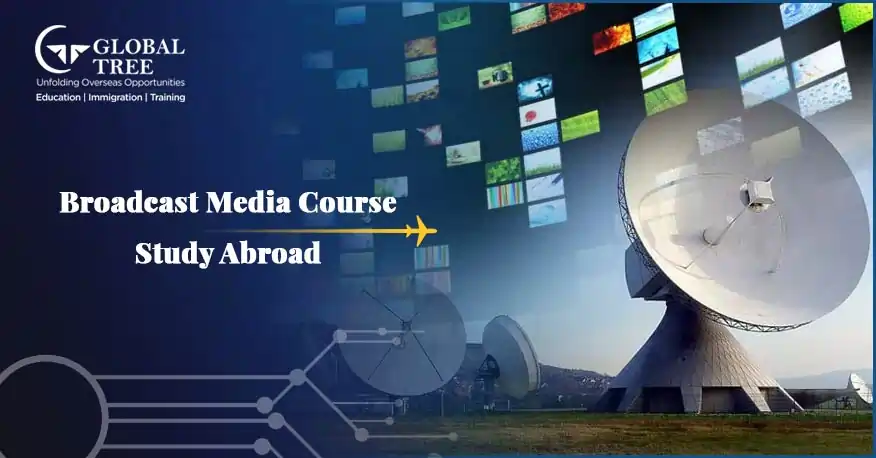Study Broadcast Media Course Abroad

Introduction
A wide range of media are referred to as broadcast media when they are used to share, transmit, and broadcast information to the broader public. It involves using electronic means to simultaneously and widely distribute information, including print messages and audio or video content, to a huge number of people, including television, radio, newspapers, magazines, and digital media like the internet, emails, and texts.
Brands, companies, and governments use broadcasting networks to educate the public about their goods and services. With a degree in broadcast media, you can prepare for technical and administrative positions involving all of these technologies and mediums. Choose the Best Broadcast Media Course & Colleges to Study Abroad.
Who is eligible to study Broadcast Media Course Abroad?
You need to be really passionate about research in order to pursue a profession in broadcast media. You need unwavering stamina to work in a fast-paced, time-constrained atmosphere because researching topics and acquiring information might be challenging. You must be flexible to work irregular hours.
You also need to be a superb team player with good interpersonal and communication skills. If you feel you have the aforementioned characteristics, studying broadcast media is a wise choice.
How much does it cost to study Broadcast Media Course Abroad?
The normal entry requirement for the media industry is a bachelor's degree in mass communication or a field closely related to the media. This degree can be pursued directly after high school. A bachelor's degree in broadcast media can be earned in around four years for between $6,967 and $25,100 in tuition and fees in the US. In the US, a master's degree in broadcast media normally lasts 1.5 years and costs $19,226.
What is the Future Scope of Broadcast Media Course Abroad?
The Internet and social media are the main networked communication tools in the connected world of today, making it simpler than ever to communicate with audiences around the world. A career in broadcast media offers excellent job options as the media sector expands. The U.S. Bureau of Labour Statistics (BLS) projects that between 2020 and 2030, employment of news analysts, reporters, and journalists will increase by 6%.
From 2020 to 2030, it is anticipated that overall employment for broadcast, sound, and video technicians would increase by 21%, which is substantially faster than the average for all occupations. Over the next ten years, there are expected to be, on average, 18,000 new job openings for technicians working in broadcast, sound, and video.
Trending Career Options in Broadcast Media Course Abroad
Career as a Videographer
Videographers capture dynamic images that convey a fascinating narrative. They have the right to record anything and anything, including the swearing-in of an elected official, the introduction of new products, a television program, and a CEO's speech. The ultimate output might be a local news clip, a 30-second TV commercial or even a shorter social media clip, a full-length documentary or scripted film, or an internal training video.
(Read more: Enhance your Career with Study Abroad Programs in General Engineering and Technology)
Career as a Broadcaster
Broadcasters are journalists who deliver news on radio or television. They could work as sports analysts or news anchors. They might also write scripts, direct news, and provide voiceovers for commercials and news pieces.
Career as a Production Helper
Producers, directors, and other members of the cast and crew are helped by production assistants in the studio and on the set. Prior to filming, they help with lighting and equipment preparation. Production assistants may take care of celebrities and on-air personalities. This could entail tasks like arranging interviews with special guests, taking calls, and organising transportation and catering for various initiatives.
Career as a Television Engineer
The main duty of a broadcast engineer is to control radio and television transmitters. A broadcast engineer may use and maintain brand-new equipment in a studio. They ensure that live video, commercials, special effects, and graphics are broadcast appropriately.









